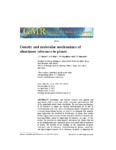Use este identificador para citar ou linkar para este item:
http://www.alice.cnptia.embrapa.br/alice/handle/doc/940820| Title: | Genetic and molecular mechanisms of aluminum tolerance in plants. |
| Authors: | SIMOES, C. C.  MELO, J. O.   MAGALHAES, J. V.   GUIMARAES, C. T.   |
| Affiliation: | C.C. Simões, UFMG; JANAINA DE OLIVEIRA MELO, UFMG; JURANDIR VIEIRA DE MAGALHAES, CNPMS; CLAUDIA TEIXEIRA GUIMARAES, CNPMS. |
| Date Issued: | 2012 |
| Citation: | Genetics and Molecular Research, Ribeirão Preto, v. 11, n. 3, p. 1949-1957, 2012. |
| Description: | Aluminum (Al) toxicity restricts root growth and agricultural yield in acid soils, which constitute approximately 40% of the potentially arable lands worldwide. The two main mechanisms of Al tolerance in plants are internal detoxification of Al and its exclusion from root cells. Genes encoding membrane transporters and accessory transcription factors, as well as cis-elements that enhance gene expression, are involved in Al tolerance in plants; thus studies of these genes and accessory factors should be the focus of molecular breeding efforts aimed at improving Al tolerance in crops. In this review, we describe the main genetic and molecular studies that led to the identification and cloning of genes associated with Al tolerance in plants. We include recent findings on the regulation of genes associated with Al tolerance. Understanding the genetic, molecular, and physiological aspects of Al tolerance in plants is important for generating cultivars adapted to acid soils, thereby contributing to food security worldwide. |
| NAL Thesaurus: | aluminum |
| Keywords: | Tolerance Organic acids Regulatory factors QTL |
| DOI: | 10.4238/2012.July.19.14 |
| Type of Material: | Artigo de periódico |
| Access: | openAccess |
| Appears in Collections: | Artigo em periódico indexado (CNPMS)  |
Files in This Item:
| File | Description | Size | Format | |
|---|---|---|---|---|
| Geneticmolecular.pdf | 366,13 kB | Adobe PDF |  View/Open |









